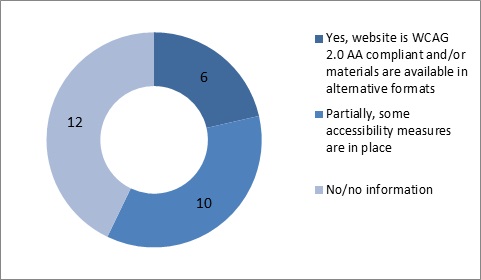Is information about how to complain about problems with exercising the right to political participation accessible?
A lack of information in accessible formats can both discourage people from making a complaint in the first place and operate as an obstacle to progressing through the complaints process. Making information about complaints mechanisms accessible for persons includes developing easy-to-read material, large print versions and audio-visual material such as information in audio format or videos with subtitles or sign language. However, making information accessible must be accompanied by steps to make it available to persons with disabilities, for example by having such information clearly marked at polling stations and well sign-posted on relevant Internet sites.
With much information on how to complain about alleged rights violations made available online, it is particularly important that websites are accessible. This indicator looks at whether information about how and where to complain in the event of problems exercising the right to political participation is provided in alternative formats and if the relevant website meets WCAG 2.0 AA standards. As testing the accessibility of relevant websites is beyond the scope of this research, the data below is based on websites’ self-assessment of their accessibility.
Is information on complaints mechanisms regarding political participation accessible to persons with disabilities?

Source: FRA, 2014
The analysis shows that in six EU Member States – the Czech Republic, Lithuania, Malta, Poland, Spain and Sweden –information about how and where to complain about voting rights is provided on a website that meets WCAG 2.0 AA standards or in other accessible formats. For example, the website of the Czech Ministry of Interior, which contains information on how to make complaints regarding elections, is compatible with WCAG 2.0 AA standards. In some cases, such as the website of the National Commission of Persons with Disability in Malta, the information provided is on complaints in general and not specifically regarding political participation.
A second group of EU Member States, Austria, Belgium, Bulgaria, Finland, Hungary, Latvia, the Netherlands, Portugal, Slovenia and the United Kingdom, provide information on complaint procedures regarding political participation in a format that is partially accessible. This category is triggered if the website does not comply with accessibility standards such as the WCAG 2.0 or if material in alternate formats only reflects the needs of some persons with disabilities. In Finland, the Parliamentary Ombudsman’s website provides information on redress in Finnish and Swedish Sign Language and the Chancellor of Justice’s website provides information in Finnish Sign Language.
In nearly half of EU Member States, the analysis either indicated that information on how to complain about problems exercising the right to political participation is not accessible to persons with disabilities, or could not identify information about how to make such complaints. For example, the website of the Central Election Service in Cyprus does not include guidelines for submitting a complaint.